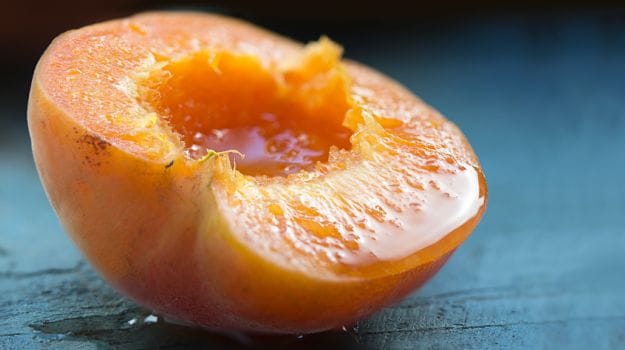Apricot is a fruit that has juicy, firm meat and a delicious sweet taste.
If we compare it with other fruits, its energy intake is quite low, since it has a high amount of water, in addition to having very few hydrates
carbons Very rich in fiber, which improves intestinal transit, and it’s content in provitamin A (beta-carotene), with antioxidant action. It is rich in minerals such as potassium and, to a lesser extent, in magnesium and calcium.

Beta-carotene is transformed into vitamin A in our body as it needs it. This vitamin is essential for vision, good condition of the skin, hair, mucous membranes, bones and for the proper functioning of the immune system, in addition to having antioxidant properties. Potassium is a mineral necessary for the transmission and generation of nerve impulses and for normal muscle activity, in addition, it intervenes in the balance of water inside and outside the cell. Magnesium is related to the functioning of the intestine, nerves and muscles, is part of bones and teeth, improves immunity and has a mild laxative effect.
| Composition per 100 grams of edible portion | |
| Calories | 39.7 |
| Carbohydrates (g) | 9.5 |
| Fiber (g) | 2.1 |
| Potassium (mg) | 290 |
| Magnesium (mg) | 12 |
| Provitamin A (mcg) | 27 |
| Vitamin C (mg) | 7 |
| mcg = micrograms |
Properties and health benefits
Its attractive orange color, together with the pleasant aroma they give off and its tasty sweetness, make the apricot one of the favorite fruits of the summer season. Due to its nutritional components, its consumption should be encouraged at all ages: children, youth, adults, athletes, pregnant women or nursing mothers and the elderly.
The beta-carotene or provitamin A content of apricots, antioxidants, gives them their characteristic orange color and makes them a recommended fruit to reduce the risk of cardiovascular, degenerative and cancer diseases. Also, various apricot substances, in addition to beta-carotene, are used to treat skin conditions.

The potassium content of apricot makes it a diuretic fruit, recommended in the dietary treatment of various cardiovascular diseases, such as high blood pressure or others associated with fluid retention. Its consumption is also convenient when diuretics are used that eliminate said mineral, and in the case of bulimia due to episodes of self-induced vomiting that cause great losses. However, the contribution of this mineral is restricted in case of advanced acute or chronic renal failure, so the consumption of apricots in these cases will be measured.
In relation to blood, it provides minerals directly involved with the formation and maturation of red blood cells: iron, copper and cobalt. However, the iron provided by fresh or dried apricot is found in the chemical form of nonheme, so the body absorbs it in small amounts. To increase the absorption of this mineral, it is convenient to take the fruit as a dessert of a varied meal, which has included other nutrients that increase its absorption, such as proteins abundant in meat, fish and eggs or the vitamin C of certain vegetables (pepper, tomato) and fruits (citrus, kiwi, tropical fruits …).
Fresh ripe apricots are rich in tannins, substances with astringent, anti-inflammatory and antioxidant properties. Some of the actions of the tannins are to dry and deflate the intestinal mucosa; the layer that covers the inside of the digestive tract, so that its consumption is adequate in case of delicate stomach and heavy digestions.
The oxalic acid that apricots contain can form salts with certain minerals such as calcium and form calcium oxalate, so their consumption must be taken into account if they suffer from this type of kidney stones, as it could aggravate the situation.
